From time immemorial divination has been a part of the human experience. There is a natural desire to make sense of situations and relationships, to develop better timing for taking action or to make better decisions in important life situations. Divination as a practice has many iterations from casual to fervently ritualized. Like meditation or prayer, it is a method humans utilize to get in touch with the cosmos, the Divine or something intangible inside/outside of themselves.

Some people use divination when feeling stuck in their own thoughts. Looking for a re-set, someone may pick up a book and place their finger on a spot to select a line or paragraph to read. From there they see what thoughts it triggers. One of our website’s regular viewers often picks a date from the Daily Post and focuses on one paragraph.
Divination can be as simple as seeing a red Cardinal when grieving for a recently deceased parent and being comforted because that particular bird was the parent’s favorite. A decision to quit a job and return to school may be agonizing. Perhaps an omen of encouragement synchronistically appears on the day it must be decided; a substantial endowment provided by a distant relative arriving in the mail (with a note expressing an uplifting intent, even though they could not possibly be aware of the pending decision).

Coincidence may be understood as meaningful events coming together in time as if somehow previously or mysteriously “arranged”. Ancient peoples also ascribed meaning to natural occurrences, referring to them as signs and omens. Through careful studying of signs and omens, astonishingly beautiful and sophisticated systematic divination structures evolved. Several such systems are still in use: I Ching, Tarot, Astrology, Runes and Numerology.

These divination systems generate signs/omens in standardized, deliberate ways, bypassing the need to wait for an external event to occur. I Ching, for example, involves which mix of yin and yang lines are to be interpreted as a result of how coins land when tossed. In Tarot it is which cards are chosen, the same with Rune stones and so on. This type of divination is not about psychic ability or any kind of special talent. The ancients developing these systems were gifted seers, shamans and oracles within their societies. The language of their divination systems is balanced and organized, encompassing symbolism and archetypes which can be integrated and utilized by anyone who cares to take up the study.

Although the divination systems are beautifully laid out, they were never intended to provide instant gratification by popping out complete answers upon demand. The ancients understood this to be dangerous in the hands of fools and unsatisfying for others in the sense of “you get out what you put in”. Their attitude was “you don’t ask the oracle for insight without giving something back”. At one time this may have been an ox, a boar or something of value. In modern times it asks for, at the very least, a concentrated effort of mind and spirit upon the divine subject matter and the willingness to stay with it until things are revealed – or even if they are not revealed. Sometimes the answer is that there is no answer forthcoming; sometimes the challenge is to stay within the frustrated awareness of one’s own ignorance. This eventually confers a measure of enlightenment.

As Carl Jung strove to understand divination himself, he uncovered concepts such as synchronicity, archetypes and the collective unconscious; invaluable resources in unlocking how truly helpful divination systems can be. There is mounting evidence that, in terms of managing practical everyday life, looking for the meaning in synchronicities works better than statistical probabilities or strict cause/effect notions. Perhaps the ancient observers realized this when constructing divination systems?
